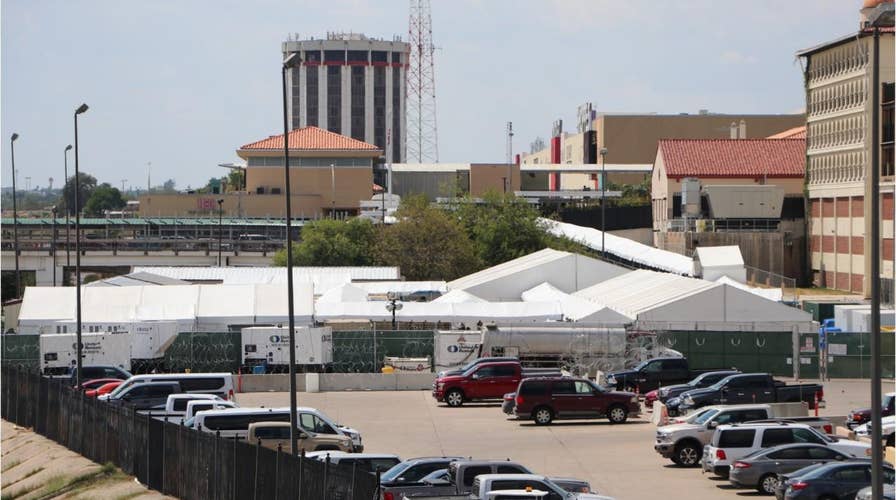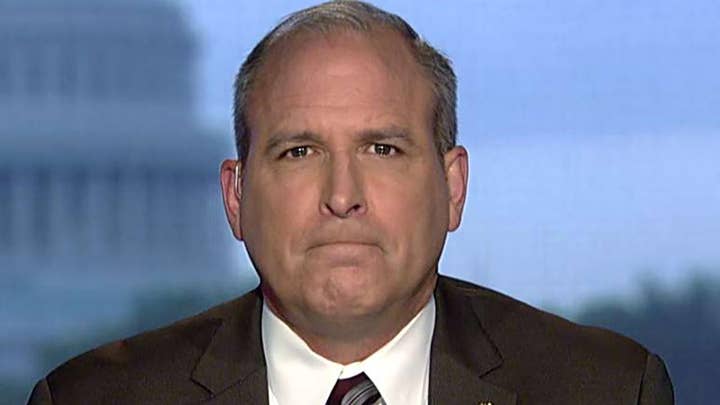Inside Trump’s immigration tent courts
An inside look into President Trump’s immigration tent court system.
Thousands of migrants returned to Mexico under the Trump administration’s “Remain in Mexico” policy have given up their asylum claims, with many of them returning home, according to statistics included in a new assessment of the policy released this week by the Department of Homeland Security.
The policy, known formally as the Migrant Protection Protocols, sends migrants seeking asylum at the southern border back to Mexico for the duration of immigration proceedings. It is a cornerstone of the administration’s efforts to end “catch and release,” by which migrants are released into the U.S. while their cases are heard.
INSIDE TRUMP'S IMMIGRATION TENT COURTS: CONTROVERSIAL SYSTEM MEANT TO FAST-TRACK ASYLUM BACKLOG
Hearings have been held in border towns such as Laredo, Texas, where temporary courtrooms have been set up by the border and migrants are put in front of a judge via video conference.
So far, the administration has returned more than 55,000 migrants to Mexico. The assessment describes the policy as an “indispensable tool in addressing the ongoing crisis at the southern border and restoring integrity to the immigration system.” It says that it has completed almost 13,000 cases as of Oct. 21.
The new assessment, significantly, cites estimates from Customs and Border Protection (CBP) that approximately 20,000 migrants are currently being sheltered in Mexico near the U.S. border as they still seek entry to the U.S. The assessment says that number, though, suggests “a significant proportion of the 55,000+ MPP returnees have chosen to abandon their claims.”
The report notes that the work of the International Organization of Migration, supported in part by the U.S. government, is helping migrants return home for free if they choose to do so. It says that as of October, almost 900 migrants have participated in that program.
The statistics put some meat on the bones of what officials have been saying for months, specifically that many of those in MPP -- particularly those who do not have a legitimate asylum claim -- realize that they will not be released into the interior and then just return home. Those returning migrants may then dissuade others from making the journey, reducing one of the "pull factors" bringing people north illegally.
“We’re now sending the message that, if you’re coming here as an economic migrant, you’re not going to be allowed into the United States,” Acting CBP Commissioner Mark Morgan, who has called MPP a “game-changer,” told reporters this month. “That’s driving a lot of people to return.”
The MPP policy has been one of the most effective parts of the administration’s crackdown on asylum seekers and illegal immigration, but also one of the most controversial. Critics claim that migrants are being sent into camps with squalid conditions, and are also at risk of violence from cartels.
CURVEBALLS IN RACE FOR DHS SECRETARY, AS IMMIGRATION HAWKS FACE BARRIERS
“Not only does this policy do nothing to protect either migrants or U.S. interests, but we have grave concerns about its legality, recent efforts to expand it, and the dangerous conditions it forces asylum seekers to endure while waiting for their cases to be heard,” said a letter from two dozen Senate Democrats sent in August to Secretary of State Mike Pompeo and Acting DHS Secretary Kevin McAleenan.
But administration officials have said that it allows for cases to be processed expeditiously, with initial hearings normally within a few months.
“MPP returnees with meritorious claims can be granted relief or protection within months, rather than remaining in limbo for years while awaiting immigration court proceedings in the United States,” the assessment says.
In terms of the interests of American citizens, the administration has claimed it has been key in the sharp decline of migrant apprehensions at the border, which have fallen by more than 60 percent since the highs in May.
MPP was initially set up in January, but was expanded over the summer amid a new agreement with the Mexican government established in June. The U.S. has been seeking to continue to expand the policy since then.
CLICK HERE TO GET THE FOX NEWS APP
This week, DHS announced that it had also begun processing migrants under MPP in Eagle Pass, Texas -- bringing to six the total number of ports of entry where MPP is underway.
“We are confident in the program’s integrity and ability to adjudicate asylum claims quickly and with all due process, McAleenan said in a statement. "We have already seen individuals granted asylum, and many more fraudulent or non-meritorious cases closed. MPP has been – and remains – an essential part of these efforts."














































